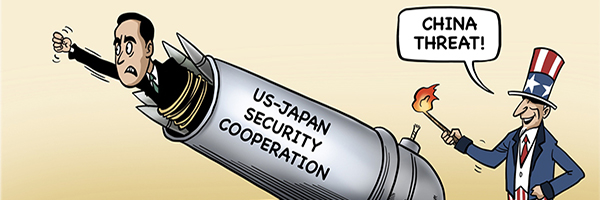‘Relying on US to contain China’ brings illusions and dangers to Japan: Global Times editorial
Japanese Prime Minister Fumio Kishida landed in Washington on Monday local time for a state visit to the US. Since Kishida is the first Japanese leader to visit Washington as a state guest since then-prime minister Shinzo Abe’s visit nine years ago, both Japan and the US attach great importance to Kishida’s visit. The Japanese side has been making noise about this visit for some time, while the American side has arranged high-profile receptions such as a White House dinner and a speech to Congress for Kishida.
For this visit, it is clear that the US and Japan have some common “strategic considerations.” For example, both sides may see it as a “ceremonial show” to further enhance their warming “honeymoon relationship,” hoping to demonstrate the US-Japan alliance is “unbreakable” by elevating their bilateral relationship to a “global partnership” status.
The current leaders of the US and Japan have their own respective goals. The Kishida administration is currently mired in a governance crisis, and this visit is a “life-saving straw” to demonstrate diplomatic achievements in order to regain domestic support. On the Washington side, as concerns among allies rise about the risks posed by the US election, President Joe Biden wants to reaffirm security commitments to allies through Kishida’s visit, at least to reassure them, and to seek support from the American people by reshaping the alliance system.
Unsurprisingly, the interpretation from the outside world almost unanimously points to China when touching upon Kishida’s visit to the US. The Financial Times revealed two weeks ago that the US and Japan are planning the biggest upgrade to their security alliance since they signed a mutual defense treaty in 1960 in a move to counter China. The two countries’ militaries will “cooperate and plan more seamlessly, particularly in a crisis such as a Taiwan conflict,” the report reads.
Furthermore, the first trilateral summit between the US, Japan and the Philippines to be held after Kishida’s meeting with Biden is also seen as Washington and Tokyo’s move to back Manila against China.
In the strategic layout of the US to contain and suppress China, Japan’s performance can no longer be described as “following suit,” but rather as actively taking on a leading role. Whether it is small multilateral military security cooperation among the US, Japan and South Korea, or among the US, Japan and the Philippines, or the US-led Indo-Pacific Economic Framework, Chips Alliance, “small yard, high fence” strategy, or the process of promoting “NATO’s Asia-Pacificization” … In which of these areas has Japan not played a “core wingman” role? In some issues, Japan is even pushing the US forward.
Facing the global mess, the US naturally welcomes Japan’s performance, which goes beyond its expectation, while also granting Japan greater military autonomy as a “reward,” by enhancing the position of the US-Japan alliance. Some people in Japan are therefore delighted, believing that this signifies the US-Japan alliance is moving toward “equality” and is evidence of Japan’s status as a major power.
However, the satisfaction brought by this “hallucinogen” can be easily shattered. The contradictions and entanglements in Japan’s foreign strategic thinking are being revealed. Driven by ideological bias and geopolitical competition, Japanese leaders and media attribute the security pressures and development challenges faced by Japan to China’s growing strength, and repeatedly hype up the “China threat” in hopes of strengthening strategic ties with the US, promoting a strategy of containment against China, and seeking to “rely on the US to restrain China.” At the same time, Japan feels uneasy about potential future strategic retrenchment and isolationism by the US. It seeks to leverage international changes to break free from post-war constraints, enhance its independent defense capabilities, and demonstrate ambitions to become a political and military power.
Japan’s political calculations are meticulous, but wearying. Whether it’s the Ukraine crisis in distant Europe or the Palestinian-Israeli conflict in the Middle East, they have little direct relevance to Japan’s national security. As for Japanese leaders repeatedly voicing concerns about the “challenge to the rules-based, free and open international order,” it is just a cliché to maintain US unipolar hegemony. It serves as a feeble excuse for the Kishida government to push forward its agenda of military expansion, appearing weak and pale.
In plain terms, under the obsession with great power competition among some in the US and Japan, the “upgrading” of the US-Japan alliance merely further strengthens Japan’s role as a tool for containing China. Actually, this not only results in self-diminishment but also entails significant dangers, potentially leading to greater instability and confrontation in the Asia-Pacific region and even the world. Regarding the seemingly glorious Kishida visit to the US, insightful individuals within Japan should recognize the hidden risks and concerns lurking behind it.

 Global Times,
Global Times,